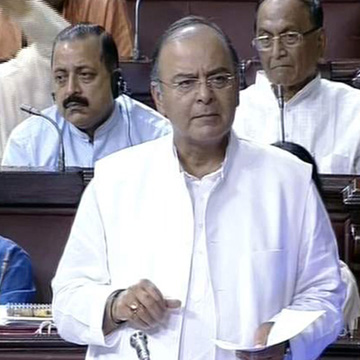 New Delhi:
New Delhi: Finance minister Arun Jaitley said on Wednesday that the Aadhaar Bill passed by the Lok Sabha last week borrows the previous UPA government’s idea but protects the privacy of citizens.
Social activists have criticised the Centre on the bill, saying the proposed legislation may be misused for “mass surveillance”.
Around 980 million citizens have been enrolled for the 12-digit biometric unique identification number called Aadhaar, a scheme conceived in 2009. By the end of 2016, the Unique Identification Authority of India (UIDAI) aims to enrol all eligible 1.1 billion residents.
“What the information will be used for, what will be the purpose of the information…that was absent in the UPA legislation,” Jaitley said in the Rajya Sabha.
The Aadhaar scheme is expected to help the government deliver benefits of major central schemes to the people, and the Centre says it save thousands of crores rupees.
The programme relies on biometrics, considered the best way to establish a unique identity. it uses the combination of fingerprints and retina scans, and accounts for situations where a resident may not have hands or eyes.
The new bill places restrictions on when and how the UIDAI can share data and notes that the biometric information - fingerprint and iris scans - will not be shared with anyone.
But the legislation gives the government sweeping powers to access the data for “efficient, transparent and targeted delivery of subsidies, benefits and services”, raising suspicions that the database could be used for surveillance.
“The UPA bill was just for the creation of a UID authority, it was not a money bill. That bill today stands altered,” Jaitley said.
The opposition has also objected to the government’s move of converting the Aadhaar Bill into a money bill.
The Rajya Sabha, where the government does not have the numbers, has no role in passing a money bill. Once passed by the Lok Sabha, it becomes a law even if the Upper House does not return it within 14 days.
Though the Upper House can’t amend a money bill, it can recommend amendments, which can be accepted or rejected by the Lok Sabha.
In case amendments are recommended, the bill will remain pending unless the process is completed in the Lok Sabha.
 New Delhi: Finance minister Arun Jaitley said on Wednesday that the Aadhaar Bill passed by the Lok Sabha last week borrows the previous UPA government’s idea but protects the privacy of citizens.
New Delhi: Finance minister Arun Jaitley said on Wednesday that the Aadhaar Bill passed by the Lok Sabha last week borrows the previous UPA government’s idea but protects the privacy of citizens.